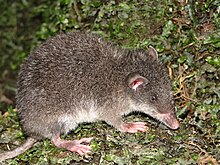
Back المتزبزبات Arabic Taruakoldunol (Paucituberculata) AVK Paucituberculata BR Opòssums rata Catalan Paucituberculata CEB Inkaspidsmus (orden) Danish Καινοληστόμορφα Greek Paucituberculata Spanish Paucituberculata EU Paucituberculados GL
| Paucituberculata | |
|---|---|

| |
| Caenolestes sangay | |
| Scientific classification | |
| Domain: | Eukaryota |
| Kingdom: | Animalia |
| Phylum: | Chordata |
| Class: | Mammalia |
| Clade: | Marsupialiformes |
| Infraclass: | Marsupialia |
| Order: | Paucituberculata Ameghino, 1894 |
| Suborders | |
| |
| Diversity | |
| 7 extant species | |
| Synonyms | |
| |
Paucituberculata /ˌpɔːsɪtjuːˌbɜːrkjuːˈleɪtə/ is an order of South American marsupials. Although currently represented only by the seven living species of shrew opossums, this order was formerly much more diverse, with more than 60 extinct species named from the fossil record, particularly from the late Oligocene to early Miocene epochs.[1][2] The earliest paucituberculatans date to the late Paleocene (Itaboraian South American land mammal age).[3] The group went through a pronounced decline in the middle Miocene epoch, which resulted in the extinction of all families of this order except for the living shrew opossums (Caenolestidae). Extinct families of Paucituberculatans include Pichipilidae, Palaeothentidae, and Abderitidae.[2]
- ^ Abello, María A. (2013). "Analysis of dental homologies and phylogeny of Paucituberculata (Mammalia: Marsupialia)". Biological Journal of the Linnean Society. 109 (2): 441–465. doi:10.1111/bij.12048. hdl:11336/13571.
- ^ a b Cite error: The named reference
Engelmanwas invoked but never defined (see the help page). - ^ Goin, Francisco J.; Candela, Adriana M.; Abello, M. Alejandra; Oliveira, Edison V. (2009). "Earliest South American paucituberculatans and their significance in the understanding of 'pseudodiprotodont' marsupial radiations". Zoological Journal of the Linnean Society. 155 (4): 867–884. doi:10.1111/j.1096-3642.2008.00471.x.